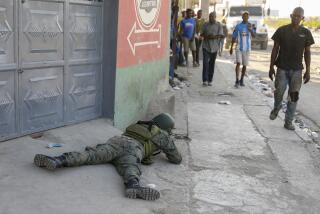COLUMN LEFT/ CLAIBORNE PELL : Free World’s Leader, Yes; Its Army, No : When conflict is on another continent, the U.S. should not be expected to provide the lion’s share of manpower.
Last week I participated in a Senate delegation led by Sens. Sam Nunn (D-Ga.) and Richard G. Lugar (R-Ind.) that traveled to Croatia, Macedonia and Moscow. I returned from that visit convinced that we need to ask and answer some very hard questions before we consider using U.S. military force in Bosnia.
Everyone agrees that hideous mayhem is occurring in Bosnia today. The Balkans have traditionally been a bloody battleground, where old hatreds die hard. The fighters are fierce and the terrain is formidable. During World War II, 26 German divisions were unable to keep peace in Yugoslavia. Serb and Croat forces, the successors to the Chetniks and Ustashi of World War II, are brutally killing each other once again.
In the 1990s version of the Balkan conflict, Bosnia’s Muslims are the primary and innocent victims of both Serbian and Croatian brutality. Today’s news reports that Croatian forces are rounding up the Muslims in Mostar and that Serbian leaders are terrorizing the non-Serbs in Banja Luka bear this out.
Terrible human-rights abuses--torture, rape and slaughter--run rampant in Bosnia. But as horrible as the situation is in Bosnia, other parts of the world--Kashmir, Cambodia, Nagorno-Karabakh, Sudan and Liberia--are also experiencing reckless violence and grave abuses that breed instability.
The questions that keep occurring to me, as they do to many Americans are: Why should we intervene in Bosnia? Why is Bosnia different from the other places of conflict in the world? What are American interests in Bosnia? It is a daunting, but necessary, challenge to the President to answer these questions for the American people and to give a clear-cut explanation of why we should be involved.
If Bosnia were part of our continent, the answers would be easier. When a disgraceful situation like the one that is occurring in Bosnia takes place in our hemisphere, we have a responsibility to lead the fight to end the slaughter and restore stability. It would be clearly in our interest to do so.
But, when the situation occurs on another continent, the United States may lead and organize the battle against it, but we do not have the responsibility to provide a lion’s share of the military manpower to fight it. This argument is especially compelling when the tragedy is occurring in a continent like Europe with its own well-established democracies, and its well-organized and well-equipped armies. We may be the leader of the Free World, but we are not the Free World’s army.
Nevertheless, I see the building pressure, domestic and foreign, on our President to do something about the ongoing slaughter. The pressure is mounting for the United States not only to lead an international effort to stop the killing, but to send in U.S. troops to do the job. I hope that we will be able to resist to the maximum extent possible the use of our ground troops to intervene in Bosnia.
While there seems to be increasing movement toward U.S. intervention, I believe that we should hold back. I would, however, be willing to see some of our troops used for peacekeeping; that is, helping enforce an arrangement that has already been reached at the negotiating table.
Before there is any use of force--either for peacemaking or peacekeeping--I believe that three steps must be taken. The President has a head start on two of them, because he has done a marvelous job of consulting with our allies and with Congress on this issue. First, the President should ensure that we secure the proper United Nations authority. Second, the President should ensure that Congress authorizes U.S. participation in a Bosnia effort. Third, and perhaps the most difficult but most important step, the President needs to explain to the American people why we should be involved. Without these three steps, any effort is doomed to failure.
More to Read
Sign up for Essential California
The most important California stories and recommendations in your inbox every morning.
You may occasionally receive promotional content from the Los Angeles Times.










